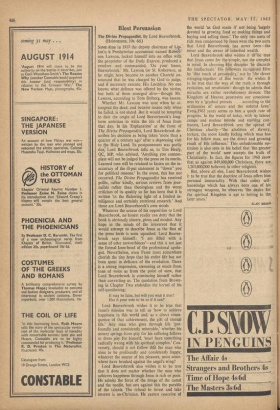Blest Persuasion
The Divine Propagandist. By Lord Beaverbrook. (Heinemann, 10s. 6d.)
SOME rime in 1917 the deputy chairman of Lip: ton's, lt Presbyterian accountant named Robeitz son Lawson, locked himself into an office with the proprietor of the Daily Express, produced a revolver and commanded, 'On your knees, Beaverbrook.' Mr. Lawson (or St. Robertson, as he might have become in another Church) an- nounced that he was charged by God to judge, and if necessary execute, His Lordship. No one knows what defence was offered by the victim, but both of them emerged alive—though Mr. Lawson, according to Tom Driberg, was insane.
Whether Mr. Lawson was sane when he at- tempted the deed, and became insane only when he failed, is not stated. But it would be tempting to date the origin of Lord Beaverbrook's long- term ambition to write the life of Jesus from that day. In his 'Explanation' at the front of The Divine Propagandist, Lord Beaverbrook de- scribes his decision as being taken 'more than a quarter of a century ago' after a depressing visit to the Holy Land. Its postponement was partly due, Lord Beaverbrook tells us, to Tim Healy, QC, MP, who advised, 'Anything you contem- plate will not be judged by the press on its merits. Learned men will be retained to fasten on the in- accuracy of the ill-put statement to "down" you for political reasons.' In the event, this has not occurred. The Divine Propagandist has received polite, rather kindly, serious reviews from jour- nalists rather than theologians and the worst criticism of its quality so far has been that it is written 'in the flickering light of a limited in- telligence and certainly restricted research.' And those are Lord Beaverbrook's own words.
Whatever the source of his opposition to Lord Beaverbrook, no honest reader can deny that the book is obviously sincere, pious and modest. Any hope in the minds of the irreverent that it would attempt to describe Jesus as the first of the press lords is soon squashed. Lord Beaver- brook says himself: 'I am filled with a sense of utter unworthiness'—and this is not just the formal knee-bend of the professional apolo- gist. Nevertheless, even Faust must somewhere cherish the tiny hope that his entire life has not been spent in defiance of the revelation. There is a strong impression, stemming as much from tone of voice as from the point of view, that Lord Beaverbrook is convincing himself rather than converting us. The quotation from Brown- ing in Chapter Two embodies the kernel of his self-questioning:
It may be false, but will you wish it true?
Has it your vote to be so if it can?
Lord Beaverbrook wishes it to be true that Jesus's mission was to tell us 'how to achieve happiness in this world and, as a direct conse- quence of that achievement, the gift of eternal life.' Any man who goes through life 'pro- foundly and consistently miserable,' whether his misery springs from pity for his suffering fellows or from pity for himself, 'must have something radically wrong with his spiritual complex.' Con- versely, should it not follow tligt the man who aims to be profoundly and consistently happy, whatever the source of his pleasure, must some- where have brushed against the angel's wing?
Lord Beaverbrook also wishes it to be true that it does not matter whether the man who achieves happiness through Jesus is rich or poor. He admits the force of the image of the camel and the needle, but sets against this the parable of the talents. The refusal to invest and take interest is un-Christian. He cannot conceive of
the world `as God made it' not being 'largely devoted to growing food or making things and buying and selling them.' The only two sorts of rich men condemned by Jesus were the two sorts that Lord Beaverbrook has never been—the miser and the owner of inherited wealth.
Lord Beaverbrook also wishes it to be true that Jesus came for the simple, not the complex in mind. In choosing His disciples 'he discards the intellectuals.' His followers recognised Him by 'that touch of personality,' not by 'the clever stringing-together of fine words.' He wishes it to be true that the way of the truth is through evolution, not revolution—though he admits that miracles are rather revolutionary devices. The Kingdom of Heaven penetrates our conscious- ness by a 'gradual proces's . . . according to the ordinances of nature and the natural laws.' Even, 1962 years seems to him a quick rate of progress. In the world of today, with its labour camps and nuclear bombs and starving con- tinents, Lord Beaverb'rook sees the spread of Christian charity—`the abolition of slavery, torture, the more kindly feeling which man has for his fellow man, are the direct and growing result of His influence.' This unfashionable op- timism is also seen in his belief that 'the greater part of the world' now accepts the truth of Christianity. In fact, the figures for 1960 show that as against 849,000,000 Christians, there are 1,263,000,000 believers in other religions.
But, above all else, Lord Beaverbrook wishes it to be true that the doctrine of Jesus offers him personal immortality. With that canny self- knowledge which has always been one of his strongest weapons, he observes 'the desire for the spiritual Kingdom is apt to belong to the later years.'
ALAN BRIEN


































 Previous page
Previous page